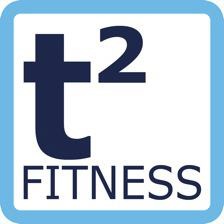In case you missed it see what’s in this section
Let's Talk
'Dude, What a Session! I Saw the Light!'
T2 Fitness is back with another blog post to help you reach your fitness goals! Read on to find out more...
“Anyone can make you tired, but not just anyone can make you better!” Martin Rooney, one of fitness' leading coaches
Where did this come from? And what was the trigger? The current barometer for workouts and PTs in the industry has seemingly taken a shift towards how close the session came to making you puke. If you do actually puke you get an unspoken fist-bump of respect and raise yourself on to the mantle of 'Hardcore'.
I put this question to some of my most trusted colleagues and some of the fitness industries finest trainers for their input...here are the most noteworthy responses:
'If all your programs do is just work people hard, what message does that send to the client? That to look good naked we have to hit the wall every time we train? We need to know where to turn the screw in training, and when to smooth the groove and focus on other aspects of training, and teach the client why and how'. Ben Coomber
Joe Clements, one of my trusted colleagues' lives by the mantra:
'Push to the limit, not past it'
The measure of a workout needs to rest in the fact that you can improve long-term performance and increase output over time. For this we need to adhere to the principle of overload, and remember that throwing a load of exercises on a bit of paper and making someone jump through hoops for an hour is, for the most part, unproductive.
It's starting to become clear that there is a pressure felt among trainers to 'entertain' clients, to WOW them with new exercises they haven't seen before in order to clarify that they've spent their money wisely. There is also added impetus to make sessions more exciting when working around other trainers in a competitive club setting, because they might be doing something weird and wonderful with their client that outshines your 'standard' session.
I truly believe you must have confidence in your delivery and have a single-minded approach focused on developing your client, not concern yourself that they will compare notes with other trainers clients, post-session on how many burpees and jump-lunges they managed to grind out during the previous hour.

Over-complexity in programming seems to be taking a recent uptick. I find this a little worrying for the simple fact we are effectively skipping ahead several steps before maximising the potential results to be gained from the previous protocol. It's akin to putting the roof on a house before all the walls are up. Ask yourself honestly if your client needs to be doing hang-snatches super-setted with pull-ups. I can almost certainly state they don't. Is this programme designed with the clients benefit in mind, or with the end result of destroying their ability to shower and dress afterwards, or possibly to stroke your own ego and prove your worth? Does the fact they ache for four days after training with you prove anything at all?
It's all good to be raising the bar and everyone loves the light-hearted relationship with a client of faux-Love-Hate. At times the benefit to a real thrashing in the gym is undeniable, but as a benchmark to 'improve' upon next time? Unfortunately not. What about as the culmination of a training phase sensibly reached and well-designed? Absolutely!
The art of administering exercise processes in my experience is predicting the response to a stimulus, adapting when things deviate from your prediction, understanding the right application, and knowing when is the correct time to up the ante (and when not to).
The body has a remarkable ability to adapt to the stressors thrown its way. It's the reason our cardiovascular system adapts to altitude when training above sea-level, and also why we tan when exposed to UV for long periods of time. These are two examples of the body making itself more efficient. When it comes to exercise the body will do this providing the recovery methods (nutrition and rest) are adequate, and the stimulus doesn't outweigh the bodies ability to respond positively. However, systematic overload to the extreme won't yield higher results in the way systematic overload with realistic parameters will.
It reminds me of times I've witnessed, and taken part in 'Train the Trainer' events. The premise is the trainer switches roles with the client, and the client has a chance to 'return the favour' so to speak. All those hours of being told what to do by a PT culminate in a revenge session. Sometimes these might be for a charity auction initiative, sometimes they're used as an incentive after a goal has been met or a package of sessions has been completed. Regardless of the meaning behind the event, the sessions will invariably result in the trainer being battered all over the gym with impossible loads, for impossible set/rep schemes, with impossibly short rest periods!

Realistically it takes zero understanding of programming principles to design such a session and invariably it will be hard and induce muscle soreness. But does it achieve anything?
Now re-read Martin Rooneys' quote at the top this piece...Can you tell me the difference? Are you tiring your client out? Or are you working towards a better-performing version of themselves?
Now the fact is when you're a full-time PT it can be difficult, time-consuming and, at times, irrelevant to programme every fine details of every clients programme. Not everyone needs tooth-comb level precision to their training sessions, and not everyone will match your planning with their attendance, but I would implore you to at least have a loose sense of periodisation to the sessions. If your clients' overall focus is fat-loss or muscle-gain then you should at least be cycling on and off phases of training that target these end-goals. Spend some time focused on the main goal, and have something different to substitute in every now and then to offer a different stimulus. It can easily be as basic as that, but it should follow a pattern and a structure.
Now don't get it wrong, I've been on the other side of the fence when clients don't train very often and have no real goal. There are times when clients are dead-set on intensity all the time and it's a mindset that is hard to break.
It's another clear trend in a growing market of the fitness industry where people are far more empowered to try tougher events and attend Bootcamp sessions and Mud Runs. I think it's awesome that people are more open to different training modalities, and the bonding experience and team atmosphere ensures long-term adherence to exercise, which is a huge improvement on times past, let's be honest. The issue here is that it can often lead to people entering contests or attending sessions when they don't possess the adequate conditioning. There is no way you want to be the person that drops out of a group of this nature, and often you'll join a group already someway along their journey rather than at the beginning, missing the 'warmup' sessions.
It's equally difficult to attend anything like this and give less that maximum effort because you'll be dragged along in the atmosphere, as well as encouraged and motivated to the 'nth' degree. This will be a problem if you're slightly under the weather, or carrying a small injury as your ability to withstand a high-octane session and recover will be compromised.
The incidence of 'Extended DOMs', fatigue, low immune-function and lack of motivation are more common now than I've ever known, and it can often be attributed to lack of ability to recovery, and continued overload.

True overtraining is awful. It leaves people with all of the above as well as a lack of real energy to use in daily activities. The unfortunate truth is I've lost count of the times I've read a Facebook or Twitter update bragging of huge DOMs on a daily basis, #ObliteratedLegs. There is absolutely nothing wrong with working hard and struggling to complete sets. Progressive overload is the only way to improve in the long-term. However this is not to say a workout that doesn't wreck your ability to lace up your shoes should be a disappointment.
If I made you do a thousand light-weight reps of bicep-curls and nothing else in a training session you would feel pain the next day. Is it productive? Highly unlikely. What it has done is localised some extreme fatigue of the muscles that flex the elbow, and exhausted that movement pattern. You'll be no leaner, stronger, more powerful or athletic having completed this session, but you'll ache. Is that really the focus?
The important take-home point if you're a trainer is Martin Rooney's sentence at the very beginning. Make sure there's a reason for exposing your client to the tougher sessions and try to have an idea of what the focus should be.
If you're a fitness fanatic the take-home is this...learn more about your own body, knowledge is a powerful, and sometimes dangerous thing. We have a tendency to think if something is good then twice as much is twice as good and this isn't always the case. Try listening to your body and understanding your energy levels a little more. Structure your training to have a peak. Work towards it and then give your body some time to recover before realigning your training to a further goal. You'll be amazed at how much more productive your sessions will be with some goal-focused training, rather than some 'tire me out' exercise.
For more from us check out www.t2fitness.co.uk
Weather in Swindon
Listings






















